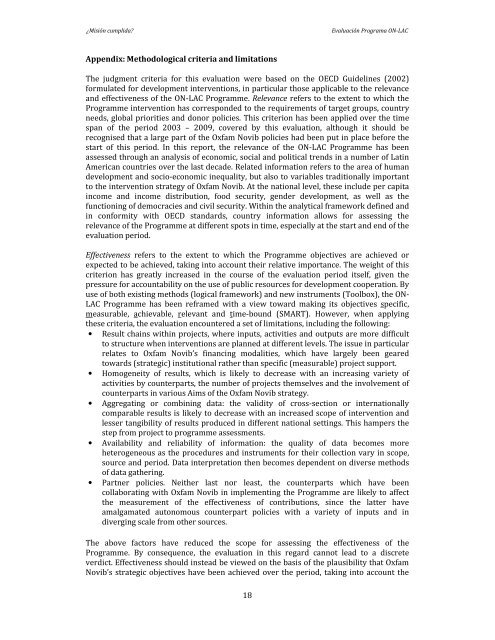¿MISION CUMPLIDA? EVALUACIÓN DEL PROGRAMA DE ... - Novib
¿MISION CUMPLIDA? EVALUACIÓN DEL PROGRAMA DE ... - Novib
¿MISION CUMPLIDA? EVALUACIÓN DEL PROGRAMA DE ... - Novib
Create successful ePaper yourself
Turn your PDF publications into a flip-book with our unique Google optimized e-Paper software.
¿Misión cumplida? Evaluación Programa ON-LAC<br />
Appendix: Methodological criteria and limitations<br />
The judgment criteria for this evaluation were based on the OECD Guidelines (2002)<br />
formulated for development interventions, in particular those applicable to the relevance<br />
and effectiveness of the ON-LAC Programme. Relevance refers to the extent to which the<br />
Programme intervention has corresponded to the requirements of target groups, country<br />
needs, global priorities and donor policies. This criterion has been applied over the time<br />
span of the period 2003 – 2009, covered by this evaluation, although it should be<br />
recognised that a large part of the Oxfam <strong>Novib</strong> policies had been put in place before the<br />
start of this period. In this report, the relevance of the ON-LAC Programme has been<br />
assessed through an analysis of economic, social and political trends in a number of Latin<br />
American countries over the last decade. Related information refers to the area of human<br />
development and socio-economic inequality, but also to variables traditionally important<br />
to the intervention strategy of Oxfam <strong>Novib</strong>. At the national level, these include per capita<br />
income and income distribution, food security, gender development, as well as the<br />
functioning of democracies and civil security. Within the analytical framework defined and<br />
in conformity with OECD standards, country information allows for assessing the<br />
relevance of the Programme at different spots in time, especially at the start and end of the<br />
evaluation period.<br />
Effectiveness refers to the extent to which the Programme objectives are achieved or<br />
expected to be achieved, taking into account their relative importance. The weight of this<br />
criterion has greatly increased in the course of the evaluation period itself, given the<br />
pressure for accountability on the use of public resources for development cooperation. By<br />
use of both existing methods (logical framework) and new instruments (Toolbox), the ON-<br />
LAC Programme has been reframed with a view toward making its objectives specific,<br />
measurable, achievable, relevant and time-bound (SMART). However, when applying<br />
these criteria, the evaluation encountered a set of limitations, including the following:<br />
• Result chains within projects, where inputs, activities and outputs are more difficult<br />
to structure when interventions are planned at different levels. The issue in particular<br />
relates to Oxfam <strong>Novib</strong>’s financing modalities, which have largely been geared<br />
towards (strategic) institutional rather than specific (measurable) project support.<br />
• Homogeneity of results, which is likely to decrease with an increasing variety of<br />
activities by counterparts, the number of projects themselves and the involvement of<br />
counterparts in various Aims of the Oxfam <strong>Novib</strong> strategy.<br />
• Aggregating or combining data: the validity of cross-section or internationally<br />
comparable results is likely to decrease with an increased scope of intervention and<br />
lesser tangibility of results produced in different national settings. This hampers the<br />
step from project to programme assessments.<br />
• Availability and reliability of information: the quality of data becomes more<br />
heterogeneous as the procedures and instruments for their collection vary in scope,<br />
source and period. Data interpretation then becomes dependent on diverse methods<br />
of data gathering.<br />
• Partner policies. Neither last nor least, the counterparts which have been<br />
collaborating with Oxfam <strong>Novib</strong> in implementing the Programme are likely to affect<br />
the measurement of the effectiveness of contributions, since the latter have<br />
amalgamated autonomous counterpart policies with a variety of inputs and in<br />
diverging scale from other sources.<br />
The above factors have reduced the scope for assessing the effectiveness of the<br />
Programme. By consequence, the evaluation in this regard cannot lead to a discrete<br />
verdict. Effectiveness should instead be viewed on the basis of the plausibility that Oxfam<br />
<strong>Novib</strong>’s strategic objectives have been achieved over the period, taking into account the<br />
18



